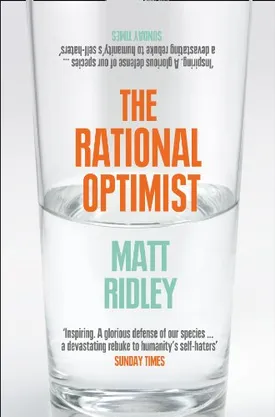The Rational Optimist: How Prosperity Evolves by Matt Ridley
In “The Rational Optimist: How Prosperity Evolves,” British journalist and scientist Matt Ridley chronicles the remarkable rise of humanity and economic progress over the past 10,000 years. Ridley examines the different forces – from technological and economic innovations to scientific breakthroughs, sociopolitical movements and entrepreneurial thinking – that have enabled humanity to move from a primitive hunter-gatherer lifestyle to the modern world of commerce and industry.
In the book, Ridley argues that these advances in human progress have been driven not by top-down edicts from governments or politicians but rather by “bottom-up” innovation – meaning the collective efforts of “ordinary” people who are seeking to improve their lives by developing inventions, inventions that “lighten the burden, reduce the cost and increase the desire to produce more”, thus propelling forward greater economic prosperity in a spiraling manner.
Rather than seeing the world’s current problems as caused by human activity, Ridley instead looks at how individuals can take positive steps to foster further technological advancements and human improvement. He promotes the notion of “cultural evolution” – interesting in that it indicates that gradual technological innovations lead to wider economic betterment when such innovations become widespread and adopted. He also outlines how important trade between countries has been in accelerating technological and economic progress.
In addition to putting forth his own optimistic view on prosperity, Ridley also examines why some countries have succeeded economically and others have not. Ridley proposes that countries have reaped the rewards of success when they have had strong market systems that foster creativity and invention; reliable and lasting property rights; and a well-developed education system. He also asserts that personal freedom and economic opportunity go hand-in-hand, since individuals are motivated to pursue new ideas and make advancements when they are certain they will benefit from such activities.
Ridley’s “The Rational Optimist” is an excellent resource for those interested in learning how we got to where we are today, and how we can continue to make improvements so that everyone can benefit from the advances in technology and economics that have enabled so much development over the past centuries. By outlining how culture, markets, and technology have played a key role in extending prosperity to the human race, Ridley offers a message that is both optimistic and inspiring. In his own words, “We do not inhabit a static world, but one that is ready in many ways to improve for the better if we only give it a chance.” Understanding prosperity in the way Ridley does is key for those who wish to create a more prosperous and egalitarian world.

